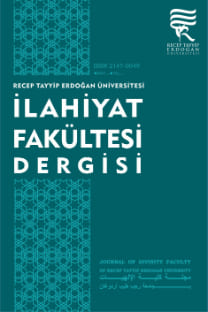İBN ÂŞÛR’UN TEFSİRİ VE TEFSİRİNİN MUKADDİMESİNDE KIRÂAT OLGUSU
Ibn Ashur's Commentary and the Phenomenon of Recitation in the Introduction of His Commentary
İbn Ashur, Tahrir, Qıraat, Yedi Harf, The Mushaf,
___
- İbn Rüşd el-Cedd, Ebü’l-Velîd Muhammed b. Ahmed, el-Beyân ve’t-tahsîl, nşr. Muhammed Haccî, Beyrut 1408/1988. İbn Teymiyye el-Harânî, Takuyyiddin Abü’l-Abbâs Ahmed b. Abdi’l-Halîm, Mecmûu’l-fetevâ, thk. Abdurrahman b. Muhammed b. Kâsım, Medine 1416/1995. Jeffery, Arthur, Materials For The History of The Text of The Quran, Leiden 1937. el-Kâdî, Abdülfettâh el-Kırâatü’ş-şâzzetü ve tevcîhühâ min lüğati’l-A’rabî, nşr. Dâru’l-Kütübi’l-Arabî, Beyrut 1401/1981. el-Kazvînî, Celâleddîn Muhammed b. Abdirrahmân el-Hâtib, Telhîsu’l-miftâh fî’l-meânî ve’l-beyân, Kopenhag 1853. el-Kurtubî, Ebû Abdillâh Muhammed b. Ahmed b. Ebî Bekr b. Ferh, el-Câmi’ li-ahkâmi’l-Ķur’ân, thk. Abdullah b. Hasen, Müesssetü’r-Risâle, Beyrut 1427/2006. Mahfuz, Muhammed, Teracimü'l-müellifine't-tunusiyyin, Darü’l-Garbi’l-İslami, Beyrut 1982. Müslim b. Haccâc el-Kuşeyrî, Sahih-i Müslim, thk. Nazar b. Muham-med Ebu Kuteybe, nşr. Dâru Tayyibe, 1427/2006 ys. en-Nîsâbûrî, Ahmed b. Hüseyn Ebû Bekir el-İsbehânî, el-Mebsût fi’l-kırâati’l-aşr, thk. Hamza Hâkîmî, Dimeşk 2011. Nurmuhammedov, Annaoraz, İbn Âşûr ve Mukaddimesi Bağlamında Tefsir Usûlündeki Yeri, (basılmamış doktora tezi), UÜSBE, Bursa 2005. el-Pâlûvî, Abdülfettâh, Zübdetü’l-İrfân, İstanbul ts. Râgıb el-İsfehânî, Ebu’l-Kâsım Hüseyn b. Muhammed, el-Müfredât fî ğaribi’l-Kur’ân, thk. Merkezü’d-Dirâseti ve’l-Buhûs, nşr. Mektebe-tü Nezâru Mustafa el-Bezzâr, ys ts.
- Yayın Aralığı: 2
- Yayıncı: Recep Tayyip Erdoğan Üniversitesi İlahiyat Fakültesi
Tanzimat'tan Cumhuriyet'e Değişen Metafizik ve Edebiyat - Abdülhak Hâmid Tarhan Örneği
POSTMODERN TÜKETİM KÜLTÜRÜ ve DEĞİŞEN MÜSLÜMAN KİMLİĞİ
MUSTAFA SÂKIB DEDE’NİN GÖZÜNDEN KÜTAHYA MEVLEVÎHÂNESİ ve CELÂLEDDİN ERGŪN ÇELEBİ
DİN EĞİTİMİNDE SORUNLAR VE ÇÖZÜM ÖNERİLERİ: DİN EĞİTİMİ ABD 16. KOORDİNASYON TOPLANTISI İZLENİMLERİ
İSLÂM HUKUK TARİHİNDE SÜNNİ MEZHEPLERİN ROLÜ
George MAKDISI, Yakup MAHMUTOĞLU
İBN ÂŞÛR’UN TEFSİRİ VE TEFSİRİNİN MUKADDİMESİNDE KIRÂAT OLGUSU
DİNLERDE VE İSLAM KÜLTÜRÜNDE SABIR
ÇAĞIN EĞİTİM SORUNLARI BAĞLAMINDA İLİM, FEN VE TECRÜBE KAVRAMLARI
